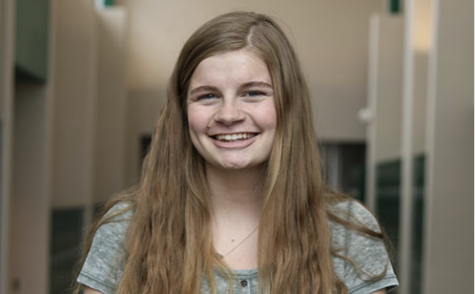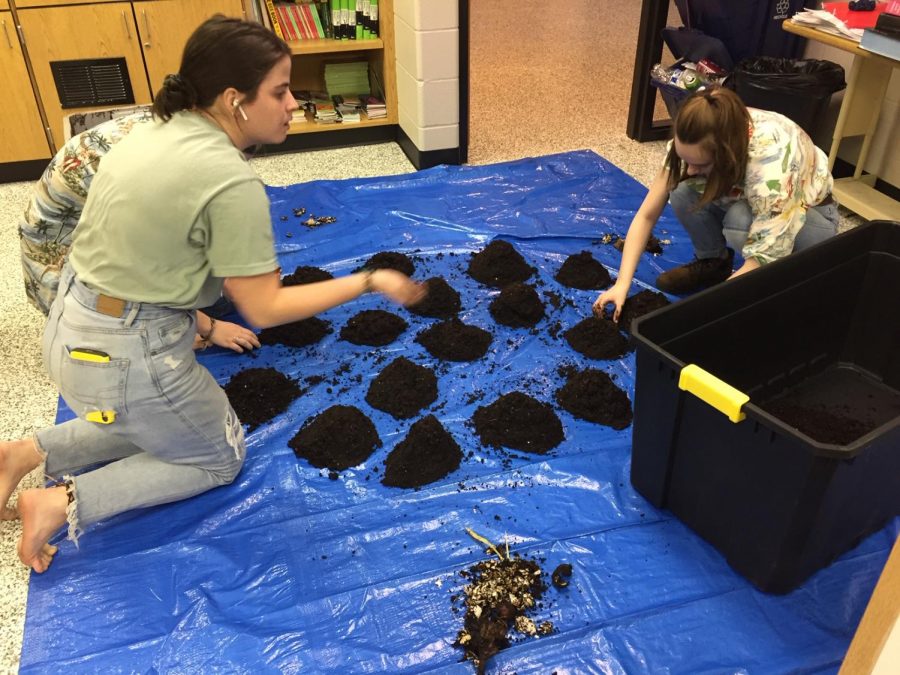Senior begins to create school-wide compost
Seniors Morgan Laney, Aspen Grieshaber and junior Emily Kresin sort out worms from the soil for the compost during an Environmental Council meeting on Feb. 4.
Recently at De Soto High School, a compost has been created in science teacher Kylee Sharp’s classroom in an attempt to make the school more eco-friendly.
The compost was started by senior Morgan Laney as a project for her Environmental Resources and Wildlife Science class.
“I was always interested in the process of composting, so when the opportunity to start one presented itself, I had to do it,” Laney said. “I imagined that the school produces a lot of food waste, and although it’s [the compost] just a small bin right now, I am hoping that it can become a school-wide thing.”
Sharp has a few students who bring decomposable material for the compost. Items such as fruit and vegetable peels, coffee grounds, black and white newspaper, printer paper and cardboard are all things that are compostable and needed for the compost to stay nutrient.
The compost is currently a work in progress, but Laney has a goal to turn her compost into a school-wide project. Because Laney’s compost is still in the works, she cannot take in as much composting material as she would like in fear of overworking the worms.
“I have a few students who are doing that [dropping off compostable material], but we have to be careful right now not to overload the worms with so much stuff that they can’t break it down,” Sharp said.
Senior and president of Environmental Council Aspen Grieshaber is conscious of her waste and often brings her leftover fruit from lunch and coffee grounds to the compost.
“Composting is awesome because it allows waste to become soil again, ultimately avoiding the landfill and adding to emissions. There are so many reasons to be sustainable in this day and age,” Grieshaber said. “It’s just a matter of doing research and staying informed so that an individual can have the least amount of negative environmental impact.”
As for the future of the compost, Sharp and Laney plan to use the recycled material for indoor planting.
“We will probably use the soil for planting things inside,” Sharp said. “The one thing we have to be careful of is the species of worms we are using are not native to Kansas, so with the soil we have right now, we don’t want to use it outside.”
Laney believes that composting and living a sustainable life are key factors to maintain Earth’s health.
“I think that it is important because we only have one Earth. If we destroy it beyond repair, we have nowhere else to go at this time,” Laney said. “If everyone can do one small thing that is eco-centered, then it can help the Earth become a little cleaner.”
The importance of recycling and being environmentally conscious has been brought into the halls of DHS not just through Laney’s compost, but a sustainable lifestyle has also been encouraged by the many recycling bins in the lunchroom. The recycling bins were provided by the Environmental Council and decorated to catch the eyes of DHS students.
“[Environmental Council] has encouraged recycling by dumping bins by hand, planting local milkweed to help pollinators and several other things,” Grieshaber said. “We are creating a culture of environmental action at DHS. Being sustainable is for everyone to join into.”
Although Laney is graduating this year, Sharp wants to keep the idea of a school-wide compost alive.
“It would be nice to have somebody who would want to take on that project and carry it forward,” Sharp said. “There are a couple of projects in that class right now that are going to be longer than just a year, so the idea is that for those projects, the students who are working on them can write up a history of what has happened and what needs to happen. Then if someone wants to carry on the project next year, they can take it further.”

Meet Camryn Robbinson, Editor in Chief. This is Camryn’s senior year, as well as her third year on staff. She has previously worked on the Green Pride...


